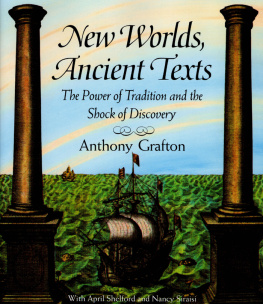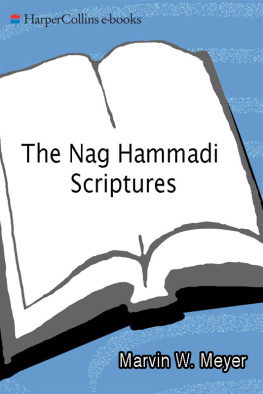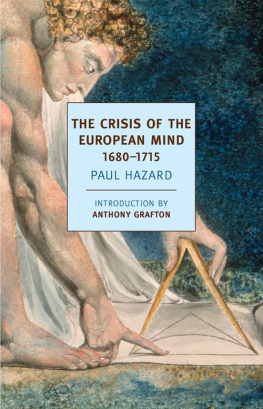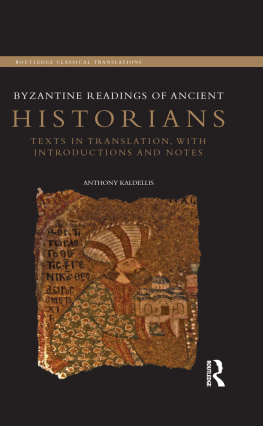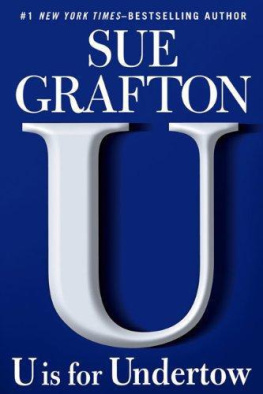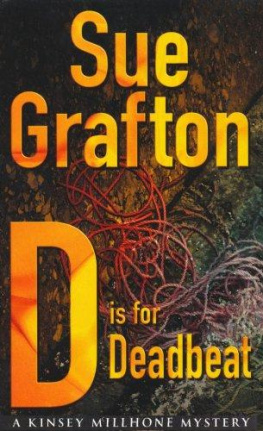New Worlds, Ancient Texts
The Power of Tradition and the Shock of Discovery
Anthony Grafton
with April Shelford and Nancy Siraisi
The Belknap Press of Harvard University Press
Cambridge, Massachusetts, and London, England
Copyright 1992 by the President and Fellows
of Harvard College
All rights reserved
Printed in the United States of America
First Harvard University Press paperback edition, 1995
Library of Congress Cataloging-in-Publication Data
Grafton, Anthony
New worlds, ancient texts :
the power of tradition and the shock of discovery /
Anthony Grafton with April Shelford and Nancy Siraisi.
p. cm.
Includes bibliographical references and index.
ISBN 0-674-61875-0 (acid-free paper) (cloth)
ISBN 0-674-61876-9 (pbk.)
1. AmericaDiscovery and exploration.
2. EuropeIntellectual life16th century.
3. EuropeIntellectual life17th century.
I. Shelford, April. II. Siraisi, Nancy. III. Title.
E121.G7 1992
970.01dc20 92-10692
CIP
Designed by Gwen Frankfeldt
T HE commemoration of a historical event often engenders rhetoric, but it also demands inquiry, scholarship, and careful reflection. This volume marks the culmination of a journey begun four years ago, when The New York Public Library invited Anthony Grafton, Andrew Mellon Professor of History at Princeton University and a Renaissance scholar, to explore the collections at The New York Public Library, which contain one of the most extensive archives in the world on sixteenth- and seventeenth-century European thought, and to organize an exhibition and write a book which would trace the transforming effects of the voyages of exploration upon European scholarship, learning, and culture from 1450 to 1700. The results are fresh insights into the complex and profound changes set in motion by the infusion of new knowledge into an established system of thought.
Understanding the dynamics of intellectual change is difficult at a distance of several centuries. What is dramatic or revolutionary assumes a prominence that is rapidly reduced to formulas such as the Scientific Revolution, formulas that mask the complexity of change. It is no small achievement that Anthony Grafton has here revealed this process as a dialectical one. Older and traditional structures were not swept away immediately by the influx of new and contradictory information, nor were those structures without internal contradiction or usefulness. For example, the traditional biblical view of the dispersion of humanity after the Flood was not immediately supplanted by information coming from the New World, because it provided a much-needed framework in which to locate intellectually peoples the Europeans had not expected to find. The printing press, it is often pointed out, made it possible to disseminate information far more rapidly and widely than ever before; but it also, in combination with the rise of publication in vernacular languages, gave old and new misinformation a second and alarmingly long life. Many of the historical figures discussed in this volume have long been familiar to us; others are less so. What is fresh in Professor Graftons approach is that he shows us that the new is never as new as we would like to believe. Sebastian Mnsters struggles with contradiction and inconsistency as he seeks to encompass within one book all the information a sixteenth-century man or woman might care to know of the world become our own. The stature of a Bartolom de Las Casas is not diminished by our learning that he formulated his humanitarian views in the context of a traditional scholastic disputation with Juan Gins de Seplveda; rather, we are left with a deeper appreciation of the versatility of an intellectual procedure that had served Europeans well for centuries. The originality of a Hobbes or a Locke is undiminished by a thoughtful reconstruction of their intellectual lineage, a lineage traceable in part to an ancient debate about the nature of humanitys distant past (primal savagery or Golden Age?), a debate given both new relevance by contacts with New World peoples and new political significance as intellectuals struggled with the disorders of their own century. Professor Grafton also places the discoveries in a wider context of intellectual changes already under way in European lifenew visions of the universe and the human body, and the rise of humanism, to mention but two. Moreover, and perhaps most important, he reveals to us that our views of the period are just as historically conditioned as those of the men who ventured past the Pillars of Hercules. There is, in all this, something of a cautionary tale. To us the distortions and errors of perception under which explorers, merchants, clerics, and scholars alike labored are obvious, often amusing, and all too often had tragic consequences; but we err if we congratulate ourselves too quickly on our cultural relativism or too naively equate more information with better judgment.
Interpreting great collections is as important as amassing them, and the Library is deeply grateful to Anthony Grafton for the gift of his scholarship, which has enriched every aspect of the Librarys participation in the quincentenary commemoration. April Shelford gave valuable help as Research Curator of the exhibition and as a contributor to this volume. Thanks are also due to the advisory committee of eminent scholars who refined the intellectual content of the exhibition: Nancy Siraisi, Hunter College; John Fleming, Princeton University, Werner Gundersheimer, Folger Shakespeare Library, James Hankins, Harvard University, Donald Kelley, Rutgers University; Eugene F. Rice, Columbia University; David Ruderman, Yale University; Noel Swerdlow, University of Chicago, and J. B. Trapp, University of London.
A generous grant from the National Endowment for the Humanities made possible the Librarys quincentenary commemoration, which includes three exhibitions at the Central Research Library, educational and public programming, and a traveling panel version of New Worlds, Ancient Texts, which will visit twenty metropolitan and university libraries in the United States. Additional support has been provided by the John Ben Snow Memorial Trust. The Library is also grateful to the American Library Association for helping to organize the national tour, thereby sharing the scholarly content of the exhibition with a larger audience.
Timothy S. Healy
President
The New York Public Library
B ETWEEN 1550 AND 1650 Western thinkers ceased to believe that they could find all important truths in ancient books. No meeting between text and reader epitomizes that change more sharply than one that took placemost appropriatelyat sea, when the Jesuit Jos de Acosta, a highly educated man who wrote one of the most original histories of what he called the Indies, realized that his own experience of travel contradicted the views of the greatest of ancient philosophers:
I will describe what happened to me when I passed to the Indies. Having read what poets and philosophers write of the Torrid Zone, I persuaded myself that when I came to the Equator, I would not be able to endure the violent heat, but it turned out otherwise. For when I passed [the Equator], which was when the sun was at its zenith there, having entered the zodiacal sign of Aries, in March, I felt so cold that I was forced to go into the sun to warm myself. What could I do then but laugh at Aristotles



